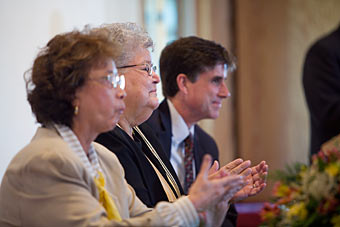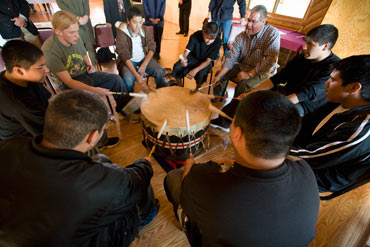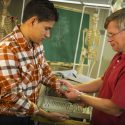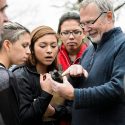Recent Sightings UW-Madison, College of the Menominee Nation enter historic partnership
Students from the College of the Menominee Nation will have a new and easy path to transfer to UW–Madison as a result of a historic new partnership agreement between the two institutions.

Celebratory signing: At a ceremony held Oct. 29, Menominee Tribal Chairperson Lisa Waukau, left, College of the Menominee Nation President Verna Fowler, center, and UW–Madison Provost and Vice Chancellor for Academic Affairs Patrick Farrell, right, participate in signing a contract that will provide CMN students an easy transfer path to UW–Madison.
Photo: Bryce Richter
UW-Madison Provost Patrick Farrell and CMN President Verna Fowler will formally sign the transfer contract agreement at a 1:30 p.m. ceremony today at the college’s Cultural Institute. Separately, CMN will be included in the UW Connections program.
CMN, located on the Menominee Indian Reservation, is one of 34 tribally controlled community colleges in the United States. It is located in Keshena, Wis., north of Shawano, and is known as a national leader in sustainable development.
The ceremony and signing of the transfer contract emerge from a decade-long linkage between the two institutions. While a 2002 agreement was signed between CMN and UW–Madison’s College of Agricultural and Life Sciences, this marks the first formal campus-to-campus partnership with one of the state’s tribal institutions.
In 2006, UW–Madison completed three agreements with members of the Wisconsin Technical College System. There is a similar, long-standing Guaranteed Transfer Program with the two-year UW Colleges.
"We are constantly striving to provide better access to UW–Madison," says Farrell. "We’re excited to be a part of this growing relationship, and hope that it will be beneficial to our institution, residents of the greater Shawano area and the entire Menominee Nation."

Members of the “Young Chiefs” play an honor song during the contract signing ceremony at the Cultural Learning Center at the College of the Menominee Nation in Keshena, Wisc., on Oct. 29.
Photo: Bryce Richter
The transfer contract agreement allows a qualified student to begin postsecondary education as a freshman at CMN and, two years later, be guaranteed admission as a transfer student at UW–Madison. The new agreement eliminates uncertainty for CMN students who complete 54 credits in specified areas, earn a 3.0 GPA and apply as transfer students to UW–Madison.
An unlimited number of qualifying CMN students will be able to take part in the program every year, as UW–Madison has the capacity to serve additional transfer students at the upperclassman level.
The separate Connections program allows students who apply to UW–Madison to receive dual-admission, start at CMN and finish their bachelor’s degrees at UW–Madison – and hold a distinctive UW–Madison student status from the beginning.
Two-year campuses participating in the Connections Program include the 13 University of Wisconsin Colleges and the liberal arts program at three Wisconsin technical colleges: Madison Area Technical College, Milwaukee Area Technical College and Nicolet Area Technical College.
Farrell and Fowler hope the agreement will strengthen the bond between the institutions.
"We are honored by this chance to meet together and visit the campus and Menominee ancestral homelands," Farrell says. "This agreement enriches our campus with the 10,000-plus years of Menominee history and culture, and we hope the new agreement will continue to enrich the Menominee Nation in developing students through both of our institutions."
Yvonne Keshena, of Clintonville, Wis., came from CMN to UW–Madison to study secondary education, math and American Indian Studies.
"I came to UW–Madison because I love the city and the campus, and I wanted to be challenged," says Keshena, who is of Menominee descent.
"The transfer process was difficult at first, being in a new city, at a new campus and trying to get to know everything. If I would have known earlier about the admission, general education requirements and the transfer process of UW–Madison, I feel it would have made the transition that much easier," she says.
In addition to expanding access and numbers of four-year degree holders, Keshena says she’s most excited about opening a new pathway to Madison for Native American students.
"This program will, without a doubt, strengthen the Native American community here on campus, as well as encourage Native students at CMN to attend UW–Madison," she says.
Recent statistics on transfer contracts, Connections, transfer admissions and Native American students:
- As of May, (the most recent figures available) 44 students have signed transfer contracts: 23 from MATC-Madison, 14 from MATC-Milwaukee and seven from Nicolet;
- For fall 2007, 1,732 applicants were offered Connections; a total of 77 students chose Connections. Since Connections started, about 65 percent of the participants subsequently make the transition to UW–Madison.
This fall’s UW–Madison transfer admissions:
- 1,276 new transfer students enrolled, including eight Native American students;
- 10.4 percent minority, up from 9.7 percent minority last year;
- 78 percent residents, 7.3 percent Minnesota Compact, 9.6 percent non-residents, 5.2 percent international students.
Overall enrollment for Native American students this fall:
- 182 undergraduates, up from 164 last fall;
- 60 graduate students, up from 55 last fall;
- 30 professional students, up from 29 last fall.
Tags: diversity, learning, recent sightings



